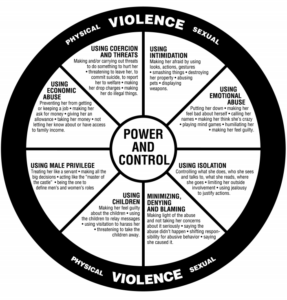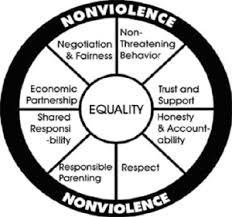Definitions:
“A pattern of abusive behavior in any relationship that is used by one partner to gain or maintain power and control over another intimate partner. Domestic violence can be physical, sexual, emotional, economic, or psychological actions or threats of actions that influence another person. This includes any behaviors that intimidate, manipulate, humiliate, isolate, frighten, terrorize, coerce, threaten, blame, hurt, injure, or wound someone.”
“An abuse of power, manifested through selfishly motivated patterns of behavior intended to exercise or maintain control over one’s partner.”
The Motivation – Power and Control
The Power and Control Wheel was developed by the Domestic Abuse Intervention Project in Duluth, MN, to show the physical, sexual, emotional, and financial tactics that batterers use to control their victims.
Some Things to Consider
- Power and control are at the hub of the wheel because they are at the center of violent relationships. Domestic violence is not caused by one or both parties being drunk, high, stressed out, or angry. Abusers want power and control over their victims and they will use any means they can to do so. (James 4:1-4)
- Each spoke of the wheel represents a category of abusive tactics, ranging from emotional abuse to economic abuse to use of children. Although every violent relationship is different, they share many of these tactics in common. (Luke 6:43-45)
- The rim of the wheel represents physical and sexual violence. Although some abusive relationships do not include the reality of physical and sexual violence, the threat is always there for the victim and the fear that goes along with that threat can be a powerful motivator for the victim to stay in the relationship.
“Fear of man will prove to be a snare, but whoever trusts in the Lord is kept safe.” Proverbs 29:25
Physical Abuse: Hitting, slapping, shoving, grabbing, pinching, biting, hair pulling, etc are types of physical abuse. This type of abuse also includes

denying a partner medical care or forcing alcohol and/or drug use upon him or her.
Sexual Abuse: Coercing or attempting to coerce any sexual contact or behavior without consent. Sexual abuse includes, but is certainly not limited to, marital rape, attacks on sexual parts of the body, forcing sex after physical violence has occurred, or treating one in a sexually demeaning manner.
Emotional Abuse: Undermining an individual’s sense of self-worth and/or self-esteem is abusive. This may include, but is not limited to constant criticism, diminishing one’s abilities, name-calling, or damaging one’s relationship with his or her children.
Economic Abuse: Is defined as making or attempting to make an individual financially dependent by maintaining total control over financial resources, withholding one’s access to money, or forbidding one’s attendance at school or employment.
Psychological Abuse: Elements of psychological abuse include – but are not limited to – causing fear by intimidation; threatening physical harm to self, partner, children, or partner’s family or friends; destruction of pets and property; and forcing isolation from family, friends, or school and/or wor
The Tactics
“No good tree bears bad fruit, nor does a bad tree bear good fruit. Each tree is recognized by its own fruit. People do not pick figs from thornbushes, or grapes from briers. A good man brings good things out of the good stored up in his heart, and an evil man brings evil things out of the evil stored up in his heart. For the mouth speaks what the heart is full of.” Luke 6:43-45
- Intimidation
- Making the victim afraid, by using:
- Looks
- Actions
- Gestures
- Smashing things
- Destroying the victim’s property
- Abusing pets
- Displaying weapons
- Making the victim afraid, by using:
- Emotional Abuse
- Putting the victim down
- Making the victim feel bad about themselves
- Calling the victim names
- Making the victim think they’re crazy
- Playing mind games
- Humiliating the victim
- Making the victim feel guilty
- Using Isolation
- Controlling what the victim does, who the victim sees and talks to, what the victim reads, where the victim goes.
- Limiting the victim’s outside involvement
- Using jealousy to justify actions
- Minimization, Denial, and Blame
- Making light of the abuse
- Not taking the victim’s concerns seriously
- Saying the abuse didn’t happen
- Shifting blame for abusive behavior
- Saying the victim caused it
- Using the Children
- Making the victim feel guilty about the children
- Using the children to relay messages
- Using visitation to harass the victim
- Threatening to take the children away
- Male Privilege
- Treating the victim like a servant
- Making all the big decisions
- Acting like the “master of the castle”
- Being the one to define men’s and women’s roles.
- Economic Abuse
- Preventing the victim from getting or keeping a job
- Making the victim ask for money
- Giving the victim an allowance
- Taking the victim’s money
- Not letting the victim know about or have access to family income
- Coercion and Threats
- Making and/or carrying out threats to do something to hurt the victim
- Threatening to leave the victim, to commit suicide, to report them to welfare
- Making the victim drop charges
- Making the victim do illegal things


